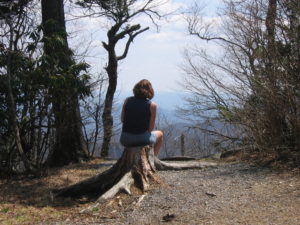Monica Behr
Monica Behr is a writer, teacher, and human rights advocate who fell prey to the Wanderlust at the age of eight, when she ran away from home into the woods with a box of Cheerios. She has been living in different cities and countries ever since. Monica has finally made her home in the woods in an actual house and no longer sustains herself on Cheerios. She is delighted to live amidst some of the oldest and greenest mountains on earth; as such, Monica writes for those near and dear whose stories have touched her the most, whose voices may not otherwise be heard. Living the story told in “My First Trip to the Mental Hospital” forced her to learn how to navigate the broken mental health system and taught her once again that “it takes a village.”
Empty Sink Publishing: In “My First Trip to the Mental Hospital,” you show us a glimpse into the world of a mother visiting her son in a mental institution. What about this particular story compelled you to put it to page?
M. Behr: Years ago we were given a prompt in a writing class: Write the thing you think you can never write about. Instantly I knew that thing would be my son’s breakdown. In the last year, that prompt has been resurfacing and I knew it was time for me to write about it.
ESP: Was there a therapeutic quality to getting this story out of your brain?
MB: If crying is therapeutic, yes. I cried when I wrote it and I still cry when I read it. Writing the last line was therapeutic because it helps me remember my role in this journey.
ESP: If you could wave a wand and fix one thing about mental health care, what would it be?
MB: I’d see to it that there are many and varied housing opportunities for people with mental illness—like the intentional communities that exist in countries outside of the U.S.
ESP: Would you mind sharing a little bit about the process you use when revising your work?
MB: For this short piece, I wanted every word to count, with nothing superfluous. So I distilled it until all I had on paper were the most essential themes and images.
Normally when I write, I wait for a week or more after the first draft before I revise it. Once I’ve revised it three or four times, I have a friend read the work aloud so I can hear if it has the cadence and rhythm I want. Then I give it to some of my best writer friends for their feedback and make more changes.
ESP: If you could have dinner with one writer, living or dead, who would it be and where would you eat?
MB: Oh, I would have barbecue with Ron Rash! (and ask him to pick his favorite place because he knows the South much better than I ever will). I would have so many questions for him—and I expect it would be messy and unnerving, which is part of why I respect his writing so much.
ESP: If you could only read one book for the rest of your life, what would it be?
MB: “Pigs in Heaven” by Barbara Kingsolver. Her characters have lived with me ever since I first read it, and her writing style is amazing.
ESP: If you could give one piece of advice to aspiring writers, what would it be?
MB: Write about things you care deeply about, or are at least very intrigued by. That way you won’t get caught up in trying to project a façade as a writer. You can be loyal to your subject—or your characters—and focus on portraying them faithfully.
ESP: What role do non-literary art forms such as film, music and visual arts play in your writing, if any?
MB: My stories are very much influenced by place, culture and social milieu. I take photographs while I’m on the road, and sometimes stories spring from them. I’m very fond of documentaries, character portraits and world music. When I’m travelling through an area, I play the music I think “belongs” to that area whether it be the blues, country music, a televangelist, or what we used to call “soul music” in Chicago or Detroit.
ESP: When was the first time that you consciously felt your life affected by art; what was the art form and who was the artist?
MB: I can remember how much Blind Faith’s (Steve Winwood) “Can’t Find My Way Home” affected me as a teenager. But long before that I was affected by theater and, always, by literature.
ESP: What inspires and drives you when you create fiction?
MB: I like to write stories about people whose voices might not otherwise be heard. I’m touched by people I’d call “small town heroes.” I want to highlight social justice, but I also enjoy quirky and eccentric characters, and sometimes I just write about things that have made me laugh.
